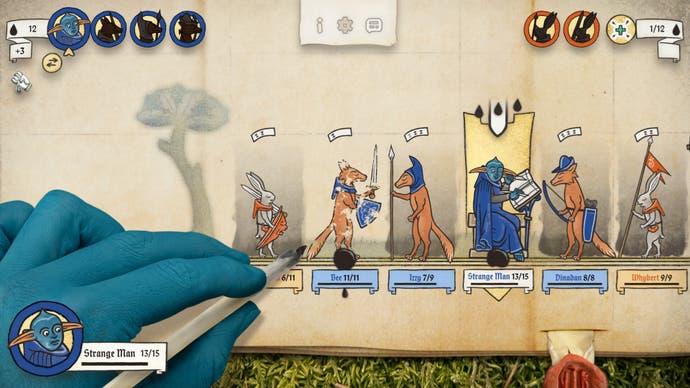Inkulinati review ¨C deep and daft tactical play
Marginal gains.
Medieval marginalia strategy game Inkulinati holds the unique honour of being the only game to make me lament, out loud: "Oh no, he's not in my butt range." Overwhelmed in number, I was hoping to force a minotaur-esque beast on the opposing army to take a nap (and skip their turn) by using my rabbit swordsman to moon them. This is, I promise you, very serious tactics, and arguably the heart of Inkulinati: thoughtfully tactical, and uncompromisingly absurd.
So rabbits have the helpful turn-skipping debuff of mooning their opponents. Foxes steal resources from their targets. Devils, naturally, set fires. And that's before you get to the less coherent creatures. It's the weird and wonderful world of "things people drew in the margins of manuscripts hundreds of years ago", weaponised.
I spent most of my time with Inkulinati's Journey Mode, a single-player campaign divided into acts where each notch on the road is a different kind of battle, or event. It's easiest to explain how combat works with the most straightforward type of battle in Inkulinati: beast battles. It's your army of (up to) five versus the enemy army, and the first to eliminate the other wins - unless an apocalypse snares you both.
With its small health pools, smaller damage pools, and round-limiting apocalyptic threats, play in Inkulinati requires intentional turn taking and positioning to get the chaos desired. Each side takes it in turns to play one unit - who can move within their range, and then act, before going to sleep. If all of one side's units are asleep, then the other side just keeps playing. With no set turn order, there's no way of knowing who plans to act next, and you have to prioritise carefully: who is in the biggest risk in their current position? Can I put them to sleep? Can I kill them? Can I shove them out of the way? Or better: can I shove them off the map, or into encroaching fire?
There is a very real - and entirely intentional - strategy in that 'pushed' characters simply slide along until they encounter the first empty space in that direction. If there is no empty space, they slide right off the battlefield, squealing as they go. There is great joy in lining up units and obstacles for a tactical shove (except, of course, when it happens at my expense, in which case it's cheating, and terrible.)
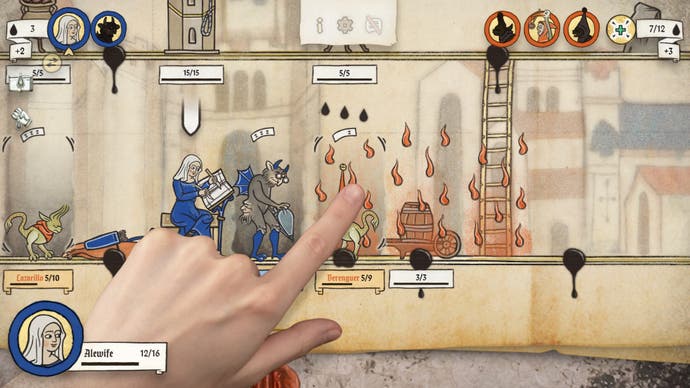
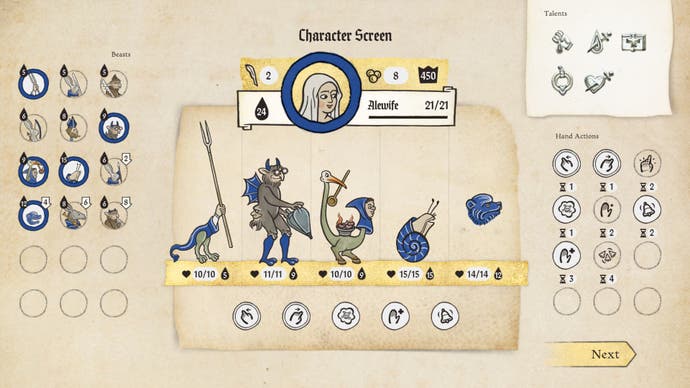
The two other kinds of battle give away what is particularly unique about Inkulinati: you aren't playing as an army of odd little creatures; you're playing as the person drawing them. So in Tiny vs Beast battles, in addition to your army of beasts, you have a Tiny Inkulinati, like a little marginaliasona, equipped with their own special actions. You draw new units, pen in hand, or swipe enemies off the map, or crush them under your fist - but these actions are limited to the area around your Tiny, and if they get killed, that's the fight over.
There's a consistent sense throughout the game of real people having fun, the idea of the characters playing the game who aren't you at the computer. It's the celebration of that very human desire to doodle in the margins, and to imagine strange and delightful things, but there's also a spirit of 'yes and' in the dialogue that makes it feel like all your opponents and shopkeepers and event characters are just another person playing game master. They're playing Dante, they're playing tiny armies, and they're playing the shopkeeper who can be bribed with cookies. Jokes can wear down over time, but there's something affectionate in the suggestion of why people play competitive games together that sustains Inkulinati's tone beyond the rabbit butts.
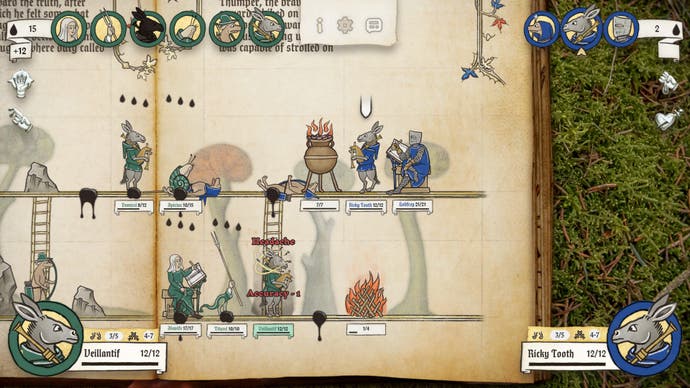
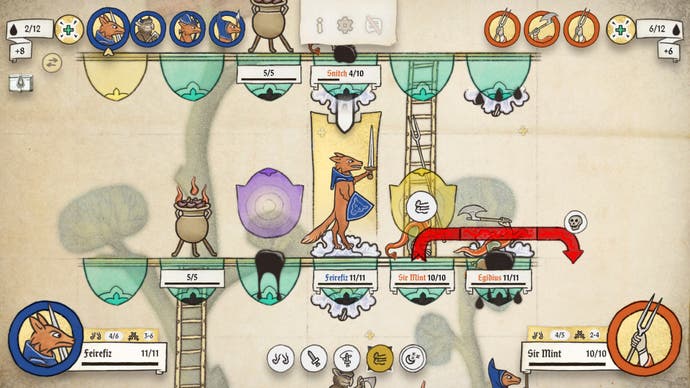
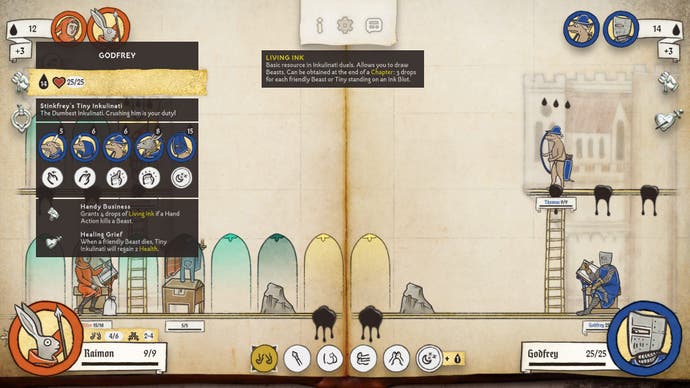
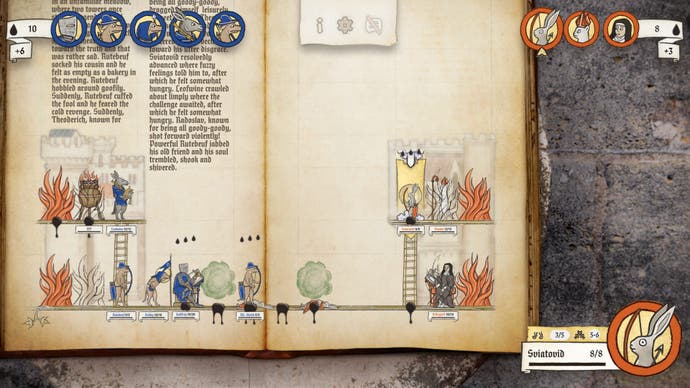
Each act ends with a duel: your Tiny versus another, with their own special abilities, and their own willingness to bump you off the map. There's also a dedicated duels mode from the starting menu, where you can customise battlefields and hazards to do battle with an assembly of pre-built armies, but without someone to hotseat with, I preferred the campaign for my AI battling.
As you go through the campaign, you start off with an army of three, and expand your selection from battle rewards and shops, along with passive abilities and new hand actions for healing and harming. Each creature has its own unique tactical benefit - you can spot general purposes that repeat across the board, like ranged fighters or spearmen, but your axe-throwing devil that inflicts bleeding and breathes fire holds a very different role in your party to the combination healing-and-bomb-throwing bowl of beans on legs. New types of creature are gated behind experience, and I consistently found that I never unlocked anything I hadn't faced as an enemy first. This is narratively tidy - like facing them in battle gives you the idea to draw them - but sometimes frustrating, as some creatures are their own best tactical counter.
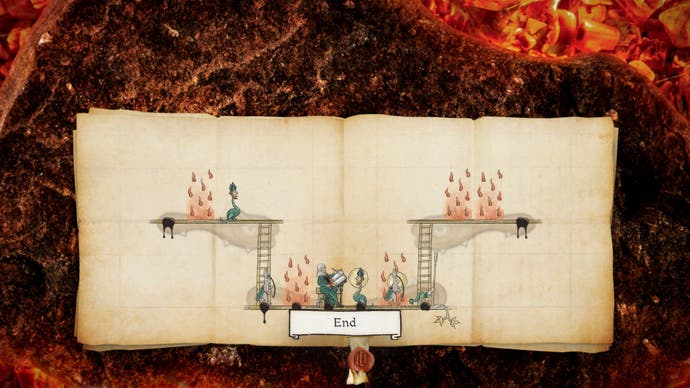
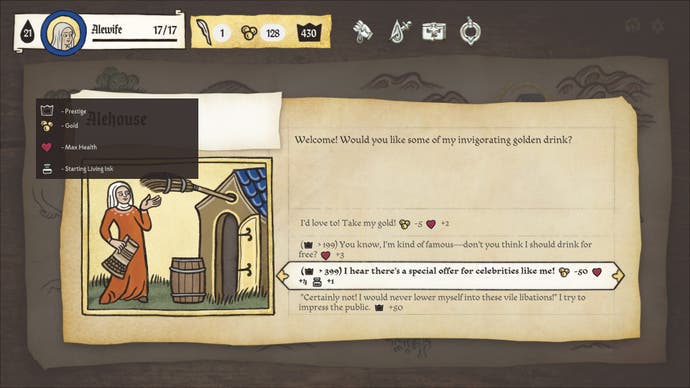

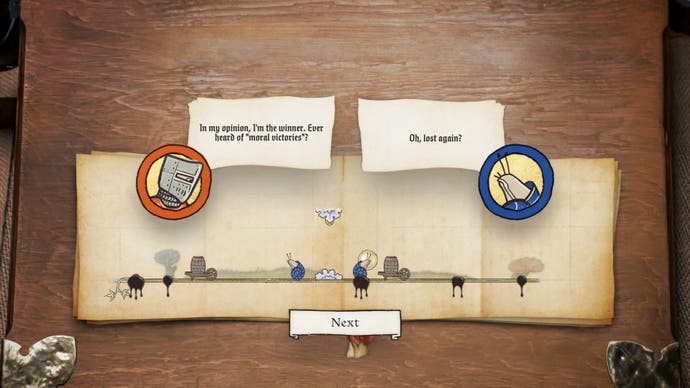
Being in Early Access, balance is a work in progress. I found myself picking the smartly dressed donkey bards every time I could for their huge area-of-effect forced nap, and dreading seeing one on the enemy side knowing my army could be knocked out every other round. Damage over time effects are also quite aggressively tuned, and while some can be played with - a plagued unit is at least free biowarfare until it goes down - others simply burn through units faster than they can be useful, or replaced. That said, neither of these things are game breaking, because cheating death is a resource in Inkulinati.
While not complex, its resource exchange is one of the things that keeps me in Journey Mode rather than skipping straight to the duels option from the start menu. Drawing the same creatures over and over again accrues boredom, an additional cost penalty to draw. A poorly chosen army or a bad route through an act can leave you ill-equipped for a duel, but in the same way you can trade gold or health or prestige in an event for some other boon, you can trade a writing quill at the point of death. Boredom goes down, and you can call a rematch - or move on, without the rewards of battle. Going back into a fight you might lose is one more tactical exchange: do I want to risk snapping more quills on the rewards of this fight now, or save them for a later fight that might not come? Is it worth paying that price just to whittle down the cost of my army?
Inkulinati is a confident strategy game, even if that comes at overshooting the balance at times. Its celebration of daft joy, dedicated aesthetic and sense of humour go hand in hand with thoughtful and strategic battles, with neither undermining the other. It's an achievement to make something that feels so playful without obscuring the tactical work underneath. Inkulinati looks to spend a year in Early Access, where they'll be expanding on the beasts, masters, and battlefields that are already present, adding online multiplayer, and adjusting balance, but if it never changed from the game I've already been playing, I'd still be happy as a clam - or maybe a man-eating snail.
